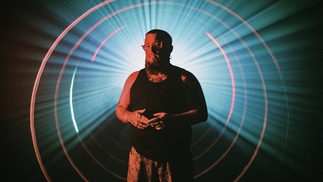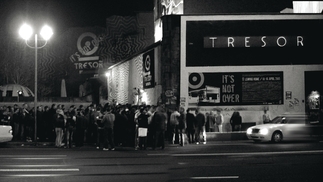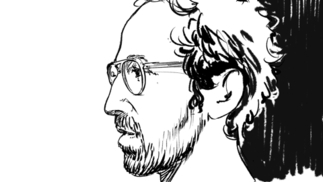LAURENT GARNIER MAKING ELECTRO CHOC FILM
French techno don talks about his new album, relaunching his label F Comm, and developing his Electro Choc movie...

It's always a pleasure to speak to the creative powerhouse that is Laurent Garnier, but it was while chatting to DJ Mag about his latest album project 'The HOME Box' — his first in six years, out now on his relaunched F Comm imprint — that the Frenchman let slip that he's currently making his own feature film. Loosely based on his book Electro Choc, coming out in English this month via the Rocket 88 publishers, the film is consuming Laurent for pretty much most of this year.
“I wrote a scenario, which is a complete fiction. I'm going to direct it and it looks like we're going to shoot the film before the end of the year,” Laurent tells DJ Mag. “But it's fiction, very freely adapted from Electro Choc — loosely based on my book and my journeys. Is somebody playing me?
It's not that it's me, it's a fiction, so there's no Laurent Garnier, there's no Carl Cox, there's no The End club or Fabric, there's different clubs and different DJs that play electronic music and their stories are crossing some of the real story, and some of it is fictional.
“But it's all based upon the way in which music can stick to your mind and it stays forever, so if something happens to you and you hear a track it will bring you back a lot of memories,” he continues, “and it's all about the strong feelings around music. The story is about somebody who is very passionate about music, and some of the things that happen to him. With his memories he's going to think about his whole story through music.”

The Gallic techno maestro says that he's been working on the film project for seven years now, and is currently embarking on the search for actors. “We're going to film it in France, England and Detroit,” he reveals. “Some real DJs will be in it, but maybe not for what they're known for.
Will they be different characters, then? Maybe — I can't say too much. This is my big project for this year, basically I'm going to stop DJing for nine months to do this project. I'm working on this every day at the moment.”
Laurent says he will find it easy to stop DJing for the best part of a year cos the film project is so exciting and he's learning so much. “I'm a very big cinema fan, I watch tons of films and have learned a lot about how to read a film, how to perceive it and stuff, it's really interesting. I like working on different projects, I like feeding my brain with some interesting stuff.”
Laurent didn't sit down in his studio to make 'The HOME Box' as a concept album — although it did have a concept behind it to start with. “I did a lot of tracks, which was when we had the idea of releasing stuff on different labels — targeting each style with each label,” he says. “How did I decide which labels to approach?
It kind of became very easy. With the labels, I didn't come to them with a full EP at first, I usually contacted them with only one track and then from that track — if they liked it — we built the idea together of the whole EP. I wanted to release the right music with the right label.
So, for instance, for the Chicago EP ['AF 0490', which refers to the Air France flight number Laurent used to catch regularly to Chicago from Paris] I sent 'Bang' to Jerome [Derradji] from Still Music and we talked together and decided what would be the best way to do an EP along with that track.”
Laurent also approached Hypercolour, Motor City Drum Ensemble's MCDE, Musique Large and Modeselektor with music — the latter with a track originally intended for their label Monkeytown.
“But they came back to me and said, 'We love the track you sent us but why don't you do some techno tracks?' I said to them, 'Are you sure?' and they said, 'Yeah, we'd love to have Laurent on 50 Weapons'. I was like, 'Wow', because I love the label so much.
So I sent them a track of mine called 'M.I.L.F', they liked it and from that we started talking about the other tracks — should I go deeper? Should I go darker? I presented them with a few tracks and we built the EP together.”
The one thing he didn't want was for labels to accept his music just because it was him, he says. “I said to them, 'Listen, we have to be clear with each other, only do it if you really, really 100% like the tracks. Do not sign them just because it's me — that's wrong, we shouldn't work that way. I'm excited to come to work with you, so you should be excited about the music I give you. I wanted them to be very honest.”

After releases in quick succession over the past few months on the aforementioned labels, Laurent is bringing the project back home by relaunching F Comm — his acclaimed label from the '90s and first half of the noughties.
He starts talking about how F Comm used to sign artists for long-term relationships, and how him and co-founder Eric Morand thought 'What would F Comm do if F Comm were still open today?' They decided that instead of developing artists, they'd like to work closely with labels they respected.
“This is when we had the idea to start releasing music on different labels and then bring everybody back under the name of F Comm as a tribute to all the people that are still doing what we tried to do years ago,” he explains. “Everybody knew, from the first EP I released, that there was going to be something at the end.
But we didn't tell anyone that it was going to be on F Comm. It was completely secret. We knew, nobody guessed, but we told everybody at the end we will do some kind of thing with an album — but we didn't know exactly what.”
“The idea with 'The HOME Box' was to regroup some tracks from each EP and some remixes to make something very special,” he continues, explaining how the last of the six EPs was on F Comm itself, 'Honey I'm Home'.
“The idea was to show the world that even though each label we chose was very different music-wise, you're all aiming for the same things, which is releasing quality music in the genre that you fight for. So even though they were all very different, they're all very similar too.
The idea was to put everybody together, like going on social networks and working with different people and at one point everybody connects with everybody else. That was the idea — to say to all these people 'You're defending different styles of music, different colours or ideas', but at the end of the day you're all working towards the same goal. And we'd like to put you all together and thank you for the good things that you're doing.”





